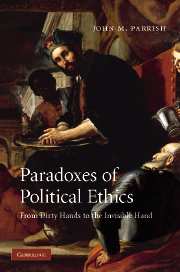4 - Hobbes's choice
Published online by Cambridge University Press: 22 September 2009
Summary
Bernard:
But what's wrong with open government? I mean, why shouldn't the public know more about what's going on?
Sir Arnold:
Are you serious? … My dear boy, it's a contradiction in terms. You can be open, or you can have government.
Bernard:
But surely the citizens of a democracy have a right to know?
Sir Humphrey:
No. They have a right to be ignorant. Knowledge only means complicity in guilt. Ignorance has a certain … dignity.
Anthony Jay and Jonathan Lynn, Yes Minister, Episode OneIn Machiavelli and in Thomas More, we find a common diagnosis of the problem of dirty hands – but two divergent prescriptions for dealing with its effects. Both writers argue that what drives the dirty hands dilemmas confronted by political leaders is ultimately connected to the moral failures of the people on whose behalf they act. Machiavelli's prescription is to propose an aristocratic intervention by leaders: a chosen few who take the necessary guilt of political action on themselves and in the process spare the people as a whole the resulting moral risks. Thomas More, on the other hand, asserts that the democratic dimension of the problem's origins precludes an aristocratic solution from ever truly addressing the problem's root causes. Only a democratic solution, More holds, can truly confront the problem at its source.
- Type
- Chapter
- Information
- Paradoxes of Political EthicsFrom Dirty Hands to the Invisible Hand, pp. 154 - 182Publisher: Cambridge University PressPrint publication year: 2007



